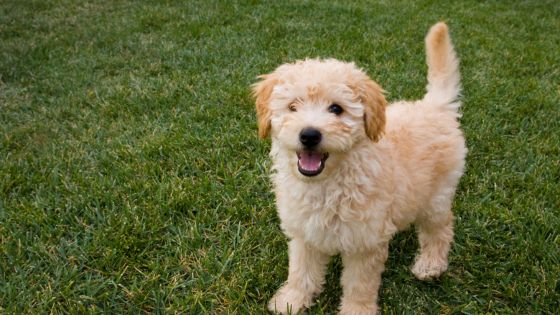Goldens are outgoing, trustworthy, eager-to-please family dogs that maintain their puppyish attitude into adulthood. They love playing and enjoy dog sports, especially those that involve retrieving.

Like other sporting breeds, Goldens need regular exercise. It is particularly true during puppyhood when their energy can be channeled into undesirable behaviors.
Temperament
Goldendoodle puppy are a social breed that thrives on human interaction. They’re playful and affectionate with family members, including children, and they get along well with other pets and dogs. It is an intelligent and trainable breed that quickly learns and responds well to positive reinforcement. However, this dog can be stubborn when pushed beyond its limits.
They’re not typically barkers, but they can express themselves if they need to use the bathroom or if someone is at the door. They’re intelligent and highly trainable, excelling in obedience classes and agility. They enjoy being part of the daily routine and love to play fetch.
These pups have a very fluffy, curly coat that sheds minimally. They require a regular brushing schedule to keep their hair from matting and may need an occasional bath if they’re particularly dirty or wet from spending time outside.
The coloring and pattern of a Goldendoodle’s coat may vary, but it must be in shades of golden brown. Some dogs will have a light color with speckling or lighter shadings extending upward from the underbody, while others will be solid. There are also variations in markings, such as parti (half-white with patches), merle, and phantom.
A Golden should have a dense, lustrous coat regardless of color or marking. The color may have a touch of cream or red, but it should not be pale or bleached.
Health
The Goldendoodle is a popular crossbreed between the Golden Retriever and the Standard or Toy Poodle. Also known as the Groodle, Foodle, or Australian Goldendoodle, this designer dog is a family-loving companion that does well in homes with other pets and children.
Because of their high energy level, Golden requires a lot of physical and mental stimulation. Daily exercise, training classes, and interactive toys help to keep them happy and healthy. It’s important to note that this breed can be prone to separation anxiety. They should be supported in the home for extended periods.
Anxiety symptoms in doodles include barking, whining, or destroying items. They can also become withdrawn or hyperactive depending on the cause of the stress. Some cases of anxiety may be resolved through desensitization training, while others need professional help.
As a result of their hereditary genes, Goldens can develop joint diseases and other health conditions like hip dysplasia, skin issues, and Addison’s disease. When purchasing a puppy, working with reputable breeders with their breeding stock tested for these hereditary ailments is essential.
They are also prone to ear infections, so it is essential to check their ears at least once a week for signs of infection, including redness, odor, and moisture. Ear cleaning products and gentle ear brushing can help keep your dog’s ears healthy and infection-free.
Training
Goldendoodles are intelligent and easy to train due to their eagerness to please. They also respond well to positive reinforcement, love belly rubs, and sloppy kisses. It makes them excellent family pets, and they get along great with kids as long as they are properly socialized when they are young.
Because of their retriever genes, Goldens are naturally curious and a bit energetic. They thrive with daily exercise alongside their humans, such as walks, runs, hikes, and playtime. They do not do well when left alone for extended periods, so they are best suited to homes with a fenced backyard or a walkable neighborhood.
They do not do well with aggressive training methods and will only be rewarded for their desired behavior with treats and praise. That is why it is essential to have a well-trained professional help you with your puppy’s training.
One of the first things you can start with is teaching your puppy to sit to be greeted. It will lead them to focus on you instead of jumping up on people and begging for attention. Establish a daily routine with regular potty times, naps, and bedtimes. Establishing these routines will help your dog stay calm and relaxed throughout the day. If your pup is a food-motivated eater, you can also work on their self-control by making them wait to eat.
Care
Goldens are calm dogs that do well with kids and elders despite their high energy levels. They are also good-natured toward other pets and cats. However, they may become anxious if left alone for extended periods. It can be prevented with regular training and by ensuring your dog has lots of social activity throughout the day.
They are intelligent and highly trainable, making teaching obedience commands and tricks easy. They also excel in activities like agility and obedience classes. These pups are food-motivated, so reward-based training techniques can help them learn quickly and eagerly. They are a naturally social breed, so exposing them to other people and places is essential early in life. It can prevent them from becoming fearful of strangers later in life.
These are energetic dogs, and they need 30-60 minutes of physical exercise daily. It can be a short walk, a romp in the yard, or an active game of fetch or frisbee. They are also natural joggers, so running with them in the park is a fun way to burn off excess energy.
They are sensitive to diet and should be fed quality, nutritionally balanced dog food designed for puppies or adults. It can be purchased from a pet store or sourced from a reputable breeder who prioritizes the health and well-being of their puppies. They conduct necessary health screenings and promote ethical breeding practices.
